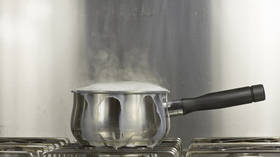Russia-Ukraine conflict will cause milk prices to soar – media

Global prices for milk are reportedly facing a further dramatic growth due to the Russia-Ukraine conflict, adding to the existing pressures from rising energy costs and disruptions related to the coronavirus pandemic.
Supply chain disruption due to Covid has already caused the price of products vital to dairy production, such as whole milk powder and anhydrous milk fats, to skyrocket.
In January, producers in Australia, New Zealand (which alone controls about 35% of global milk exports), the EU, the US, and Argentina saw an output drop of 1.7% year-on-year, according to data from commodity broker StoneX, as quoted by the Financial Times.
New Zealand and the EU together account for around 70% of all milk exports, followed by the US, Australia, Brazil and Argentina. However, output has fallen steeply, with New Zealand and Australia posting declines of over 6%.
Anhydrous milk fat hit a record price of $7,111 per ton on March 15, while whole milk powder surged to an eight-year high this month.
“The conflict in Ukraine has added to an already complex Covid-19 operating environment, impacting global supply chains, the oil price, and the global supply of grains,” Miles Hurrell, chief executive at New Zealand multinational dairy co-operative Fonterra told the FT.
Russia, Ukraine, and China are leading exporters of both nitrogen-based fertilizers and wheat – a vital feed for cattle along with corn and soy. The issues in gas supply, worsened by the offensive in Ukraine, together with the pandemic restrictions imposed in China after another Covid outbreak, have made both difficult to acquire.
The combination of all those factors makes production “bloody expensive,” said Craig Hough, director of policy and strategy at Australian Dairy Farmers.
For more stories on economy & finance visit RT's business section













